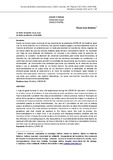| dc.rights.license | http://creativecommons.org/licenses/by-nc-sa/3.0/ve/ | es_VE |
| dc.contributor.author | Sanz Rubiales, Álvaro | |
| dc.date.accessioned | 2020-08-04T03:48:12Z | |
| dc.date.available | 2020-08-04T03:48:12Z | |
| dc.date.issued | 2020-08-03 | |
| dc.identifier.issn | 2244-7482 | es |
| dc.identifier.uri | http://www.saber.ula.ve/handle/123456789/46924 | |
| dc.description.abstract | Puede ser bueno hacer memoria de las vivencias de la pandemia COVID-19. En bioética, igual que en otros ámbitos de la medicina, fue preciso redactar guías y recomendaciones sobre la manera de afrontar un problema que no tenía precedentes en la práctica clínica. Algunos de los temas sobre los que fue preciso redactar guías éticas o comentarios fueron: la necesidad del triaje en una situación de limitación de recursos y los criterios para la selección de pacientes, el cuidado y la atención de personas vulnerables para evitar discriminaciones, la atención de una población de riesgo como son los ancianos internados en residencias y el certificado de inmunidad para permitir la movilidad de las personas que hubiesen superado la enfermedad. Las limitaciones más evidentes que hubo que afrontar en la redacción de estas guías y que se deberían evitar en un futuro fueron: las prisas para poder presentar las recomendaciones en un plazo corto en un escenario incierto y cambiante, la soledad del enfermo grave debido al aislamiento y el morir en soledad, la limitación para realizar un estudio adecuado poder consultar a expertos, la imposibilidad de una deliberación presencial que hubo que sustituir con medios telemáticos, no tener una función consultiva sino de valoración de decisiones ya adoptadas. | es_VE |
| dc.language.iso | es | es_VE |
| dc.rights | info:eu-repo/semantics/openAccess | es_VE |
| dc.subject | Bioética | es_VE |
| dc.subject | COVID-19 | es_VE |
| dc.title | COVID y prisas | es_VE |
| dc.title.alternative | COVID and rush | es_VE |
| dc.type | info:eu-repo/semantics/article | es_VE |
| dcterms.dateAccepted | 23/06/2020 | es |
| dcterms.dateSubmitted | 08/06/2020 | es |
| dc.description.abstract1 | It may be good to keep in mind the experiences during the COVID-19 pandemic. In bioethics, as in other areas of medicine, it was necessary to write guidelines and recommendations on how to deal with a problem that was unprecedented in clinical practice. Some of the topics on which ethics guides or comments had to be written were: the need for triage in a situation of limitation of resources and the criteria for the selection of patients, the care and treatment of vulnerable people to avoid discrimination, the care of a population at risk such as elderly people admitted in nursing homes, and the immunity passports to allow the mobility of people apparently cured. The most obvious limitations that had to be faced in the writing of these guidelines and that should be avoided in the future were: the rush to present the recommendations in a short time in an uncertain and changing scenario, isolation and the loneliness of the seriously ill and dying alone, the limitation to carry out an adequate study and the difficulty in consulting experts, the impossibility of a presential deliberation that had to be replaced with telematic resources, to have a role that is not limited to a consultative function but that requires valuing and sometimes assuming decisions already taken. | es_VE |
| dc.description.colacion | 1-87 | es_VE |
| dc.description.email | srubiales@hotmail.com | es_VE |
| dc.description.frecuencia | semestral | es |
| dc.identifier.depositolegal | ppi200802ME3759 | es |
| dc.publisher.pais | Venezuela | es_VE |
| dc.subject.facultad | Facultad de Medicina | es_VE |
| dc.subject.institucion | Universidad de Los Andes | es_VE |
| dc.subject.keywords | COVID-19 | es_VE |
| dc.subject.keywords | Bioethics | es_VE |
| dc.subject.publicacionelectronica | Revista de Bioética Latinoamericana | es |
| dc.subject.seccion | Revista de Bioética Latinoamericana: Artículos | es_VE |
| dc.subject.thematiccategory | Medicina y Salud | es_VE |
| dc.subject.tipo | Revistas | es_VE |
| dc.type.media | Texto | es_VE |


